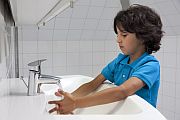- 10 Strategies to Overcome Insomnia
- Could Artificial Sweeteners Be Aging the Brain Faster?
- Techniques for Soothing Your Nervous System
- Does the Water in Your House Smell Funny? Here’s Why
- Can a Daily Dose of Apple Cider Vinegar Actually Aid Weight Loss?
- 6 Health Beverages That Can Actually Spike Your Blood Sugar
- Treatment Options for Social Anxiety Disorder
- Understanding the Connection Between Anxiety and Depression
- How Daily Prunes Can Influence Cholesterol and Inflammation
- When to Take B12 for Better Absorption and Energy
With School Back in Session, Kids Need Refresher Course on Hand-Washing


With the start of the new school year, parents need to remind their children about the importance of hand-washing and how to do it properly, an infectious-disease expert says.
Hand-washing is the best way to prevent many types of infections, and is especially important after using the bathroom and before eating, according to Dr. Beverly Connelly. She’s with the division of infectious diseases at Cincinnati Children’s Hospital Medical Center, in Ohio.
“Germs get left everywhere! Good hand hygiene practices help prevent catching colds and respiratory viral infections, stomach bugs and diarrhea, as well as MRSA [methicillin-resistant Staphylococcus aureus] and other skin infections. Make hand hygiene a practice you and your family practice every day,” she said in a hospital news release.
Parents should explain to children why it’s important to wash their hands, and should set a good example by following a hand-washing routine at home. Tell children it’s especially important to wash their hands after using the bathroom, after sneezing or blowing their nose, and before eating.
Teach children to wash their hands with soap and water for at least 20 seconds. If they use hand sanitizer, they should rub it over all the surfaces of their hands and fingers until their hands are dry, Connelly said.
Parents should put individual packets of hand sanitizer wipes in their children’s lunches so they can clean their hands before eating, she said.
It’s also important for parents to learn about hand hygiene practices at school. They should ask or find out if school bathrooms have soap dispensers, whether classrooms have bottles of hand sanitizer, and whether teachers make sure children clean their hands before lunch or snack time, Connelly suggested.
More information
The U.S. Centers for Disease Control and Prevention has more about hand-washing.
Source: HealthDay
Copyright © 2026 HealthDay. All rights reserved.










